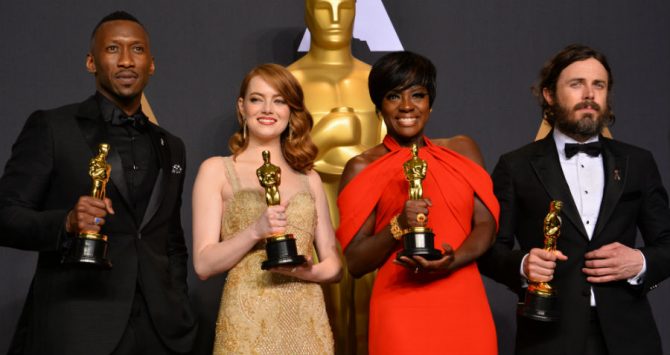
In a bid to boost diversity both on-screen and behind the camera, the Academy Awards has announced new diversity criteria for movies wanting to be considered for the ‘Best Picture’ Oscar.
From 2024, producers and studios wishing to enter a movie for the Best Picture category will also need to submit a confidential form on the diversity of the cast and crew. A movie will need to fulfill two of four new standards to be eligible (the form will be introduced from 2022, but the Best Picture threshold will only take effect from 2024).
Related: Why are Oscar voters still afraid of two men having hot, steamy sex?
Change starts now. We’ve announced new representation and inclusion standards for Best Picture eligibility, beginning with the 96th #Oscars. Read more here: https://t.co/qdxtlZIVKb pic.twitter.com/hR6c2jb5LM
— The Academy (@TheAcademy) September 9, 2020
The four standards are as follows.
How about we take this to the next level?
Our newsletter is like a refreshing cocktail (or mocktail) of LGBTQ+ entertainment and pop culture, served up with a side of eye-candy.
Standard A: The movie must have a lead or “significant” supporting actor from an “underrepresented racial or ethnic group,” or 30% of the more minor roles must come from under-represented groups (women, certain racial or ethnic groups, LGBTQ, disabled). Alternatively, the main storyline may be focussed on under-represented groups.
Standard B: At least two of the creative heads among the crew – director, casting director, costumer designer, etc – are from underrepresented groups (again, women, racial or ethnic groups, LGBTQ or disabled). Alternatively, at least six of the crew are from under-represented racial groups, or 30% of the crew come from under-represented groups.
Standard C: “The film’s distribution or financing company has paid apprenticeships or internships”, from the underrepresented groups, including LGBTQ and certain ethnic groups, as well as offering training opportunities and skills development for individuals from these groups.
Standard D: The final standard concerns the marketing and distribution departments of movies, saying, “The studio and/or film company has multiple in-house senior executives from” the aforementioned groups (women, certain ethnic groups, LGBTQ and/or disabled).
Once again, a movie only needs to meet two of the above standards (a point lost on many of those reacting to the announcement).
Related: The Oscar noms are in and so is the hashtag #OscarsSoStraight. Here’s what people are saying
In a joint statement fully explaining the initiative, Academy President David Rubin and Academy CEO Dawn Hudson said: “The aperture must widen to reflect our diverse global population in both the creation of motion pictures and in the audiences who connect with them. The Academy is committed to playing a vital role in helping make this a reality.”
Aside from Best Picture, the other Academy categories will keep their current eligibility requirements.
Predictably, the announcement has been met with a mixed reaction online.
Actors Kirstie Alley and James Woods were among the first to slam the decision.
“This is a disgrace to artists everywhere,” said former Cheers actress Alley. “Can you imagine telling Picasso what had to be in his fucking paintings. You people have lost your minds. Control artists, control individual thought .. OSCAR ORWELL.”
This is a disgrace to artists everywhere…can you imagine telling Picasso what had to be in his fucking paintings. You people have lost your minds. Control artists,control individual thought .. OSCAR ORWELL https://t.co/QhM8e6msnj
— Kirstie Alley (@kirstiealley) September 9, 2020
Woods simply called it, “Madness.”
Also wading into the debate was the gay, former diplomat, Richard Grenell.
“It’s no longer the Best Picture, it’s the Most Politically Correct Picture.”
The Democrats controlling Hollywood demand changes to the Oscars.
It’s no longer the Best Picture, it’s the Most Politically Correct Picture. https://t.co/wzuwRp1ewe
— Richard Grenell (@RichardGrenell) September 9, 2020
Others welcomed the move.
You’re going to hear a ton of people whine, but you have to sometimes FORCE change.
— Aaron T. Starks 🌊 (@StarkyLuv73) September 9, 2020
Seems like a good time to remind industry folks that there’s a sea of scripts out there that already meet those new Oscar requirements without even trying. Because this is how diverse writers naturally tell their stories.
Hire them.
— EdithD (@edithdrod) September 9, 2020
Some say that the rules don’t go far enough or are not as stifling as some would suggest. For example, they point out that hair, makeup, and costume departments tend to have a high number of female employees already, making that an easier standard to achieve.
Franklin Leonard, founder of screenwriting network The Black List, said: “Somewhere between 95-100% of films that would have even been considered for an Oscar have nothing to worry about, and the very few that have cause for concern can solve that problem with a comparatively extremely low resource expenditure.”


















jjose712
Promoting diversity is a thing (and a desirable thing) and other very different making it fundamental to get a nomination.
I know the oscars are nothing more than a popularity contest but quality should be the only thing that matters to get a nomination
Aaron
Quality can be subjective and potentially exclusive:
There are countless quality scripts that include diverse characters but the industry people that read them are usually White cis able-bodies straight people. That’s one filter. Then they have to finance and eventually market their film to a mainly White demographic, that’s another filter. Then the academy has to vote on films which, you guessed it, are mostly White cis able-bodied straight men over the age of 40. That’s another filter.
There are so many filters that prevent diverse scripts and talent from getting the “quality” treatment.
A lack of diversity has always been about a lack of opportunity, not a lack of ability or quality.
BoomerMyles
Why do you SJW use the word “cis” as an implied perjorative?
Cis people are 99.4% of the human race.
How is that a bad thing?
Aaron
The term SJW is so last decade. Cis is not a pejorative. You’re clearly projecting. I feel like I’m explaining things to a troll posed as a conservative boomer. Oh wait, I am! lol
JohnnyBoy2
I agree. Standard A is daft. What if the story is inherently about one class of people? How do you artificially add in lead minority actors? One example is “Lord of the Flies”, which is about a stranded group of white, male, upper-class English schoolboys. No women, no Asians, no hispanics, no black Africans, etc, etc, etc.
I thought we were moving past tokenism. This policy sets us back. Of course encourage minority representation. But, don’t make it forced or a requirement for a quality award.
JohnnyBoy2
Aaron, be an adult. BoomerMyles was not being a troll, and you don’t get to dismiss his remarks so easily.
Cam
Let me guess. Every studio will only do the 3rd and the 4th one to avoid any casting diversity.
Rock-N-RollHS
Maybe we can cast a black actor in a biopic of Hitler! Or Darwin!
We should have some “peeps of color” in the next film about an Irish or Jewish family, tho! Bring back Sammy Davis Jr! I hear he’s available!
Cam
And nothing infuriates a right wing troll more than a minority being hired.
Aaron
Amen, Cam.
rsatl222
I the next historical slave movie had better have some white lbgt characters. And white people acting as slaves………..
BaltoSteve
What’s scary … Gone with the Wind would actually pass that first qualification.
WSnyder
The Most significant thing is that the Academy recognizes that there IS an issue. I don’t know if this fairly broad criteria will make that much of a difference, but the fact they want to address it makes it significant. To be specific, I don’t mean the issue of diversity in Hollywood, I mean the Academy wants to recognize that diversity is an issue across the country. Given the broad nature of the Standards given here, I’d be very surprised if any picture couldn’t meet them [unless James Woods produces a remake of ‘Triumph of the Will’, which I’m sure is a pet project of his].
JAW
Will a Catholic have to play a Catholic role… Or???
How about diversity on the basketball court and football field???
How about diversity in Black Fraternities and Sororities.
Can a Mexican American play a role about a Puerto Rican?
If LGBT roles must be played by LGBT’s… Then does the same go for straight people?
Does BET (TV) need to go?
What about resorts and camp grounds that are men only or women only?
How about we all just get along.
Cam
Interesting, there was nothing in the criteria about reserving roles.
But the idea of a few non white people getting hired seems to have upset you so much you couldn’t even read the article clearly.
Aaron
JAW, none of what you said has to do with what the Academy is trying to achieve. Go home. You’re drunk lol
rsatl222
YES! So more BET!
dmanhart
Well said my friend. No more gay actors playing straight actors.
This sort of shit just motivates Trumpsters to ensure they vote this November.
Affirmative action for movies? Wow. Just wow.
Cam
@dmanhart
Typical right wing troll comment. “Equality will upset right wingers, so stop asking for it!”
JohnnyBoy2
Cam, instead of just making snarky remarks and not addressing what JAW said, why not dialog? Why not express why you think JAW is in error?
Jay002
BET was created because African American actors, directors, writers, etc were told constantly that your entertainment doesn’t sell to a mainstream audience. Years ago African Americans were totally blocked out television in the southern part of the USA. I was watching a documentary on Hugh Hefner and when he started his television show Playboy after dark he was almost taken off the air because he had Nat King Cole and Ella Fitzgerald as guest on his show. I don’t agree with what The Academy Is doing But before people start complaining you need to look at the history of diversity and the challenges that certain people had to go through.
dmanhart
Your heart is in the right place. But we are talking about today. Not the past.
The past is a totally different topic. People don’t know how horrific it was to be a POC in Hollywood in the past.
Cam
@dmanhart
So your point is that because things are slightly better now, that people shouldn’t push for change.
BoomerMyles
So why is the billionaire founder of BET, Bob Johnson a major trump supporter?
You know, the guy who said black nations are “sh*thole” countries, and no country run by a black man was ever successful, fired a casino CFO because he was black, broke US law by not renting apartments to black people, buying a ful page ad in the the NYT calling for the death penalty of 5 black children and never apologizing even after being legally exonerated.
Yeah, BET founder Bob Johnson LOVES trump. It’s not about “representation”! It’s about the Benjamins! The only color that really matters is GREEN!.
controversial2019
Doesn’t this mean that some films, that critics and/or audiences consider to be read, will be banned from being nominated?
I think about The Darkest Hour which was lauded by many; basically all white men. So unless there was more “inclusivity “ behind the scenes, a film like that which many thought was great, could never be nominated?
Whereas Love, Simon – basically all white men (the reveal of Simon’s love interest not being until the end of the film) COULD be nominated because the storyline centres on an underrepresented group (gays).
Call Me By Your Name – all white, COULD be nominated because the storyline centres around gays.
?
Cam
Except you’re so invested in attacking the idea of diversity that you are trying to erase the fact that only 2 criteria need to be met for a film to be considered.
2 of those criteria just have to do with the companies that produce or distribute the movie having a diverse workforce. So you could have one of the movies you’d like, with an all white cast, and as long as the two companies producing and distributing it weren’t also all white, there is no problem with that movie being nominated.
quantum
The Darkest Hour DOES have women working in significant roles behind the scenes, including Producer, Production Design, Casting, and Makeup. So long as Universal has two female executives and a few internship programs designated for women, they’ve already met three out of four of the criteria without even trying.
I’ll add that “significant” has nothing to do with screen-time so far as the Academy is concerned. Anthony Hopkins won Best Actor for Silence of the Lambs but only appears in 16 minutes of the film, but nobody, the Academy included, would argue that his role isn’t significant.
The_Roxxtar
You seem entirely stuck on Category A, while also ignoring that women of all shades count. A film could still consist of all white people, if that’s what you seem to be worry about.
Aaron
The same people that are so worried about limiting opportunities for White roles and jobs were TOTALLY FINE when those roles and jobs were kept from women and minorities.
dmanhart
Schindler’s List? Titanic? Not eligible for Best Picture..
Liquid Silver
B, C, and D should already be met under normal circumstances so no issues there–and if they aren’t, that’s a huge problem.
But the next problem is A–because neither side can read “2,” quite bluntly, nor accept it.
519
I don’t know about others, but if I was hired for a job just because I’m gay, I’d be offended and I would feel like I don’t deserve it. I wouldn’t want to be the token employee. I am all for diversity and equal rights but this whole PC thing is getting out of control and it starts to feel like the conservatives are right and the lefties are trying to force diversity on people. The problem is not with the movies that are being made. The problem is with those who nominate them and decide which ones should win. But I guess it’s easier to “solve” the problem like this than just admitting that they are racists and homophobes who don’t want to change…
Cam
That’s funny, because for the last hundred years or so thousands of actors have been hired in Hollywood specifically because they WEREN’T gay, or Black, or Asian.
Interesting how that didn’t seem to bother you.
Rock-N-RollHS
Oh Candid CAMera! You are such a blasé dirty little scold! I can see what gets you hot and turned on. But you were the one who bemoaned that studios will ONLY opt for 3 and 4th criteria!
btw, does anyone watch the Oscars anymore? Or go to the movies!?
Rock-N-RollHS
Candid CAMera: “That’s funny, because for the last hundred years or so thousands of actors have been hired in Hollywood specifically because they WEREN’T gay, or Black, or Asian.
Interesting how that didn’t seem to bother you”
Well considering the country was and is mostly white and straight, is it really that “interesting”? Or surprising. I can see you rallying other countries for their lack of diversity, no? Say China, Russia, Mid-East, or South America, or Asia and Africa in general. They do have vibrant film cultures, btw. Or does that not bother you? “interesting!”
Cam
@Rock-N-RollHS
Oooops, you slipped up. Normally you just defend bigots. But this time you actually attacked the idea of non whit or straight people even getting hired.
They aren’t training trolls as well as they used to.
519
@Cam: and thousands of them have been hired regardless or because of that. Racism and homophobia is a horrible thing and I condemn everyone who is against equal rights, but I think it’s undeniable that things has been getting better in Hollywood even without the forced diversity, albeit in a slower pace than most people would like. I think that these kind of things should run their natural course, because measures like this could end up backfiring. I want movies and TV shows where the creators show me people of colour and the LGBTQ community because they want to tell stories with those characters and about those characters and not because they want to win a (lately more and more meaningless) statue.
Aaron
A lack of diversity has always been due to a lack of opportunity, not a lack of ability.
Aaron
It’s a common logical fallacy (often pedaled by men’s rights groups and White supremacists) that if you focus on hiring more women and minorities, you are compromising quality. It’s like they’re implying that the industry is dominated by straight white males because they’re just more talented, smarter, and more capable than non-straight-white-males.
dmanhart
Very true my friend.
Cam
@519
So your argument is that racists should control the pace of change. By that argument, the Civil war shouldn’t have happened because the course of slavery should have been allowed to run its natural course. Or that the civil rights marches in the 1960s shouldn’t have happened because the course of civil rights should have been left up to the White people who didn’t want minorities to have rights, or were blissfully ignorant.
519
@Cam
No, both the Civil War and the civil rights movements were the natural culmination of the prior decades and centuries where people fought for their rights and equality. In Hollywood’s case this would translate as getting rid of executives who can’t keep up with today’s world and who stick to their racist and homophobic views, so people wouldn’t even think of implementing such quotas, because nothing else would matter when it comes to the cast and crew but talent.
Minorities should speak up if they are struggling with getting a job in the industry, actors should call out studios if they were rejected for a role because they belong to a minority, do something right after it happens, not decades later. Until then it feels like for me that the Academy is trying to suck up to minorities to save face. Kind of like how big companies pretend to care about LGBTQ rights for exactly one month a year so they can secure a market for themselves…
Jay002
In the 1970’s their was a movie with a mostly African American cast it was called Car Wash it was a comedy about people working at a car wash. When the movie was shown at the Cannes film festival the judges wanted to give the movie an award for best comedy, but the American judges said you can’t give this black movie an award for best comedy. So the judges at Cannes had to come up with a special award to honor the film. If the American judges would have let the judges at Cannes do the right thing forty years ago maybe we wouldn’t be talking about this today. I don’t know if those judges were on the left or the right.
Scout
What ludicrous and poorly revised guidelines! Whoever came up with them should be tied to a tree and flogged! These new standards diminish any film’s chances of being nominated on merit. Merit has always been the gold standard for nominations. And, unless I’ve been living in a different universe, minority actors, and minority film craftspeople have been nominated and winning academy awards for years already! “Parasite” from South Korea won just last year! So, what’s the problem? Forced diversity and inclusion are shams!
Cam
Except you can’t point out one single way in which having some behind the scenes staff who are women or minorities is going to ruin anything.
Trust me, we get what the real problem is for you.
Scout
Hey Cam, Regarding your reply to my comment:
“Except you can’t point out one single way in which having some behind the scenes staff who are women or minorities is going to ruin anything.”
THEY’RE ALREADY THERE! And they’re winning awards NOW.
Aaron
Merit my ass lol
To believe that Oscars (or any entertainment awards) are based solely on merit is hilarious.
The Hollywood voting system is based on studio money, popularity, nepotism, and industry networking. The voters are also overwhelming White, male, and over 45.
Harvey Weinstein’s aggressive Oscar campaigns were NOTORIOUS in Hollywood. It’s the only reason why “Shakespeare in Love” won Best Picture over “Saving Private Ryan” in 1999.
Cam
@Scout
If they’re “Already There” as you state, then the guidelines would not produce any change because they’re already there. The fact that you are getting so upset by them shows clearly that you know that there aren’t a lot of women or minorities working behind the scenes.
So now that your lie was exposed, feel free to change direction and try something else.
Jake123
Great there’s more diversity in front of and behind the camera, but this is such an American way of doing things. “Hey kids look over here we’re so woke.” Meanwhile serial killer cops are still on the streets, Black on black crime is through the roof and a middle class has almost ceased to exist. America needs to sort out its priorities.
Charlie in Charge
You mention black on black crime. Do you realize most criminals are the same race as their victims?
Aaron
White on White crime is also “through the roof”. As a White man, I am more likely to be harassed, assaulted, and/or murdered by another White person. Using Black on Black crime is an old White supremacist argument to undermine the legitimacy and the severity of systemic racism against Black people.
frapachino
@ Aaron explain systematic racism and give specific proven examples of it happening ? Waiting!
Aaron
@frapachino: Your inability you use Google explains a lot of why you don’t know what systemic racism is. That’s not my problem lol
Prax07
Forced diversity is never a good thing. Diversity as a Requirement for anything is definitely not a good thing either. The Academy is overreaching big-time with this.
Cam
But forced racism and bigotry is fine?
barryaksarben
I for one dont care to ever see another boy meets girl movie as long as I live
Jack Meoff
What ever happened to the right person for the job? Next it will be like middle school, everybody wins and everybody gets a participation award.
LumpyPillows
While I agree in concept, there is bias. I do not like this solution, but we cannot deny the problem.
Aaron
It’s funny that you’re implying that our system is dominated by mostly straight White males because they are simply more hardworking and qualified than women and minorities lol
Jake123
@Aaron I’m not white so yeah not a supremacist. What I’m saying it’s an issue that Americans seem to refuse to discuss, which in turn assures that nothing will be done about it. America has so many issues regarding race and homophobia but despite protests and riots NOTHING changes. It’s really upsetting. Next week there will be another cop on black crime or school shooting etc.
Aaron
Where did I call you a supremacist? Lol
Jake123
@Aaron saying I’m using an old White supremacist term to under mine the legitimacy of systematic racism. So I’m not a white supremacist I just talk like one. My Dad is Black btw xx
frapachino
Art is dead!
Joshooeerr
This kind of madness leads to practices like hiring dummy execs to meet diversity rules, so there will be black, hispanic or asian staffers with little-to-scant experience consigned to sit in offices and do nothing in order for a production to qualify. Sure, some lucky person gets paid (usually not that much) for doing either nothing or something pointless, but it’s actually demeaning and ultimately stands in the way of real talent being able to rise through the ranks. If you think that sounds absurd, it’s precisely what happened in places like South Africa post-apartheid, and in numerous other places where diversity has been legally mandated. It helps almost no-one. And it has a profoundly negative impact on creativity and quality. There are better ways of reaching real diversity.
Cam
Translation: You are saying there aren’t qualified women or minorities.
Jay002
Well this is the United States and no company is going to risk millions of dollars putting someone in a position that they are not qualified for (unless you are the current president.) This change is about the best picture category which the Academy already made changes to what movie they decide to nominate based on popularity, a message, or many other factors it is not just based on just one point of view.
missvamp
forcing diversity guidelines squashes creativity & limits everyone. i think these guidelines are stupid & meant to be a pat on the head for all the groups it’s supposed to help.
LumpyPillows
Right idea, horrible solution.
jackscott
Diversity is important, however, these rules are so foolish. I look at a movie like Moonlight, such a great movie. Yes, it would still qualify, but why have a cloud over it… it was a diversity movie v. wow, that was the best movie of the year! I’m out on the Oscars!
Cam
While all these accounts keep coming on screaming about these rules. Let’s think about something.
Woman make up OVER 50% of the country, and racial minorities make up over 30%.
These accounts are coming in freaking out and claiming that unqualified people will have to be hired. So basically they’re saying that in a group comprising around 250 million people, there is nobody qualified to work on a movie but all of the straight white men that have been historically hired.
It’s rare that account blurt out their racism quite so obviously.
LumpyPillows
I typically agree with you in concept, but you are irritating. What a chip you have on your shoulder. And, what time you have to comment on EVERYTHING.
Aaron
@LumpyPillows, clearly you went through all the comments to notice Cam’s existence but are implying that no one has time to participate in this discussion. I mean, you made a few comments yourself. Lol
Aaron
@LumpyPillows, you’re just mad that more and more people are talking about this and people are trying to do something about it.
BoomerMyles
The last Best Picture Oscars winner wasn’t diverse.
Everyone in the film and working on the film were Korean.
I thought the goal is everyone from diverse backgrounds working together.
ShowMeGuy
“Best Picture” shouldn’t be determined by the ethnicity of the person who owns the catering company which provided meals during filming.